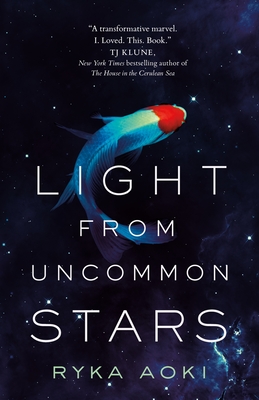- The Good: Donuts, music, queer and trans representation
- The Bad: Inconsistent tone; unresolved antagonist
- The Literary: Lots of references to classical music
The lives of three unrelated women in extremely different circumstances become entangled, and despite their differences, whether they be cursed violin bows or a Faustian bargain, they become friends over warm donuts. Shizuka Satomi must deliver the soul of one last violin prodigy to a demon to escape damnation and recover her own talent. Katrina Nguyen, a young transgender runaway, is noticed by Shizuka when she practices her violin in a public park. Lan Tran, retired starship captain and refugee in hiding, runs a donut shop with the help of her four children.
I like that all the protagonists, and even more of the secondary characters, are women of color, and their interactions in the world ring true. They all feel like women, even if they are all experiencing exaggerated situations. Most of all, Katrina is young and transgender, and struggling to accept herself and deal with the trauma inflicted on her by her parents, schoolmates, and strangers, both on and offline. Shizuka and Lan are grown women, so they’re less internally conflicted, but they struggle against their own stubbornness.
The prose luxuriates in both the experience of music and food. Lan owns a donut shop, and the other characters are consistently eating in restaurants, picking up ice cream and boba, and being served delicious handmade breakfasts by Shizuka’s house keeper. The descriptions of tastes, textures, and temperatures fill pages. In terms of music, Shizuka is classically trained, whereas Katrina wants to focus on playing video game music, so the formality of Bartók and Paganini combine with the accessibility of what’s familiar to the younger generations.
If you think a retired starship captain running a donut shop sounds quirky and fun, you’d be right. That premise combines interestingly with the optimistic and hopeful deal-with-a-demon plot, but then throw in trauma, rape, abuse, and sex work, and the three wildly different genre scenarios are blended together in a way that doesn’t work for me.
Speaking of trauma, Katrina’s plot arc is extremely difficult to read. And maybe it’s supposed to be. Maybe the everyday experiences of a young trans woman of color are terrible, and we shouldn’t sweep that away. But I pity her and her victim mindset, and it makes for a less than enjoyable reading experience. She’s a vulnerable young person, who deserves some real therapy or even just adult role models. Instead, Shizuka finds out about Katrina’s sex work and responds by saying lots of musicians have done the same throughout history, and instead of talking to Katrina about it, Shizuka capitalizes on it.
While I love a story with fully realized female protagonists, the men in this one are all flat. Katrina’s father abuses her and smashes her violin, her childhood friend steals from her and rapes her, and even Lan’s young sons are either clueless or prone to violence. The primary antagonist, the demon who wants to deliver young souls to Hell, deserves a mustache he figuratively twirls it so often.
Recommended for niche fans of hopeful, queer, trans, female-driven stories.
